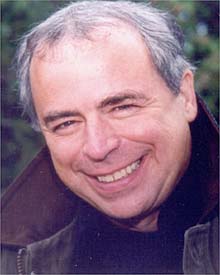Correspondent: You’ve alluded now many times to the passage at the end of that chapter, which I would describe as the American Pastoral moment. I’m very curious as to how that came to be, the particular doors, through the wrong end of the telescope…
Russo: I’m sorry. Which?
 Correspondent: The three paragraphs where you have him describing all the doors that are open at youth and then not open.
Correspondent: The three paragraphs where you have him describing all the doors that are open at youth and then not open.
Russo: Oh right.
Correspondent: Yeah, we’re talking through the wrong end of the telescope. And so on.
Russo: Yeah.
Correspondent: So I’m curious as to where that moment, which seems to me the more American Pastoral moment, came from exactly. How that came to be laid down.
Russo: You know, it’s funny. That particular metaphor of doors, of walking through doors closed behind you, and then having fewer doors to walk through and choose between, was the metaphor that I used to use when I was teaching to describe how plot worked.
Correspondent: Interesting.
Russo: When I was teaching my undergraduate and especially my graduate students. Plot is a very difficult — they say, how do you come up with a story? How do you know what happens first? What happens next? All of that. And I was trying to explain to them that the best stories, the best plots, are the ones that end up kind of paradoxically, you want to be surprised. But after the surprise, you want a sense of inevitability. Like that’s the only place the story could have gone. Those two things, that’s why a lot of books are disappointing. Because that’s a very hard effect to achieve. How can you surprise somebody even as, after they register the surprise, they say, “Oh, of course. This is the only way it can go. This is the only way it could have gone.” Those two things are antithetical. And yet the best books always have that. That coming together. So I was always looking for a metaphor to explain that to people. To my students. And I’d say, all right. Think of it this way. You’ve got a thousand doors. You choose one. You walk through it. Now you’ve got five hundred doors. You walk through that. You’ve got two hundred and fifty doors. Every time I started explaining that to students, that there were fewer and fewer doors, that was going to provide the inevitability. But there was still the surprise. You didn’t know. Every time a character makes a decision, it seems that there are so many other possibilities. So it’s a series of surprises that ends up with a sense of inevitability. But as I explained that to my students, and as I was writing this book, it occurred to me that’s also a description of life and destiny.
Correspondent: Yeah.
Russo: (laughs) So I had lectured my students and then that lecture had provided a metaphor for this — the most complex of my novels.
Correspondent: Wow. So I guess the more representative a book is of life, the more that you can grapple onto teaching metaphors. (laughs)
Russo: (laughs)
[Richard Russo has also offered an essay at Powell’s, in which he describes his own “lazy” writing impulse.]